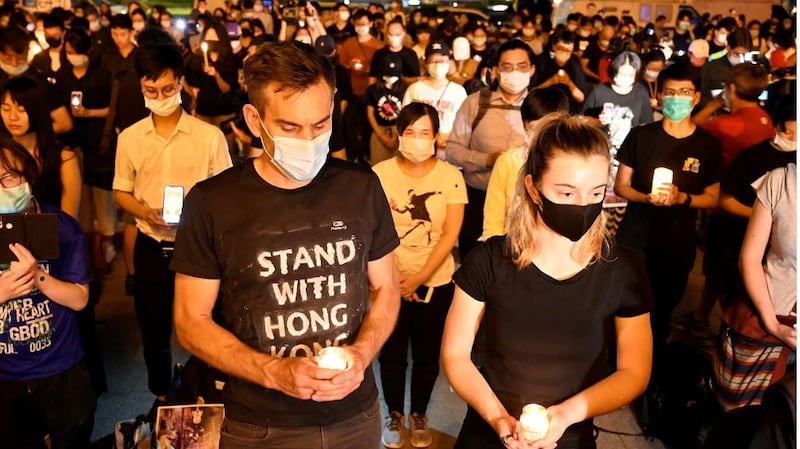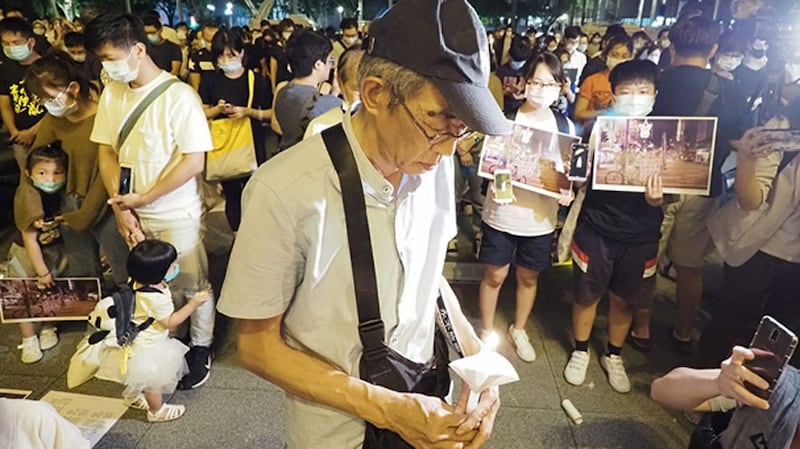Thousands of people defied a ban in Hong Kong on Thursday to commemorate those who died in the 1989 Tiananmen massacre by the People's Liberation Army (PLA), while relatives held a low-key memorial ceremony at a Beijing cemetery.
With a draconian sedition and subversion law due to be imposed on the city by the ruling Chinese Communist Party, and in spite of multiple barriers set up around Victoria Park to keep crowds out, people found their way regardless onto the multiple soccer pitches where a candlelight vigil has been held for massacre victims for the past 30 years.
Vigil organizers the Alliance in Support of Patriotic Democratic Movements of China had planned to livestream a brief ceremony of just a few minutes, and had asked people to light candles in their homes, or wherever they happened to be.
But as Alliance leader and veteran trade unionist Lee Cheuk-yan and fellow activists made their way to the football pitches, the streets in the surrounding Causeway Bay shopping district came alive with thousands of people in surgical masks, walking slowly but surely towards the park.
Some participants started lighting candles at around 6.30 p.m., but people gradually appeared on the football pitches over the following two hours, maintaining social distancing, and eventually filling some six soccer pitches, though with less density than in previous years.
Group member Huang Jinping made offerings to the dead at Beijing's Wan'an Cemetery, while repeating the group's demands for "truth, compensation and accountability."
"We are asking the government to talk to the Tiananmen Mothers, to tell the truth," Huang said. "No hardship or twists of fate will destroy our resolve."
Yin Min, 77, lost her son in the massacre.
"It’s been too long, 31 years, and we are getting older and older, and our health is getting worse and worse," Yin told RFA. "Our mood is also getting worse; we are more and more pessimistic."
"However, we still have some expectation [of a result]."

'This is my eternal pain'
Yin’s son Ye Weihang was only 19 years old when he was shot by PLA soldiers at 11.00 p.m. on June 3 in Beijing after the operation to clear Tiananmen Square was ordered by then supreme leader Deng Xiaoping.
"This is my eternal pain," she said. "When I think about it, I burst into tears."
Back in Hong Kong, those gathered in Victoria Park paid scant heed to loudspeaker messages that gatherings of more than eight people were illegal, instead singing long-familiar protest songs, while messages from some of the Tiananmen Mothers were played out online.
"Overturn the June 4 verdict!" the participants chanted, referring to the ruling Chinese Communist Party's insistence that the 1989 student-led protests on Beijing's Tiananmen Square had been a "counterrevolutionary rebellion."
Protesters also chanted: "End one-party rule!" and "Democracy in China now!"
Former 1989 labor leader Han Dongfang, who made it to the park, said he felt it was important to come regardless of the police ban.
But he said there are many other ways to commemorate the victims.
"You can commemorate them in your hearts ... in your own home, anywhere, really," Han said. "Even if you can't attend some kind of formal commemoration."
A participant surnamed Yip told RFA that her generation had been made more aware of the 1989 pro-democracy movement and its bloody suppression after taking part in last year's protest movement, which began in opposition to plans to allow extradition to mainland China, and broadened into calls for full democracy and official accountability.
"Not everyone in our generation knew what happened on June 4, 1989, but we came to learn about it through the anti-extradition movement," Yip said. "Actually, we are the same as the 1989 democracy activists, because we are fighting for democracy too."
"Freedom and democracy are so important to Hong Kong, so the people of Hong Kong won't be afraid: we will continue to stand up for them," she said.
'Free Hong Kong! Revolution now!'
Police -- including plainclothes officers more typically associated with China's state security police -- watched proceedings but didn't intervene.
Just after 8.00 p.m., the crowd fell mostly silent for one minute to honor those who died in the crackdown.
Some people chanted a slogan associated with last year's anti-extradition movement: "Free Hong Kong! Revolution now!"
Still others picked up a far more recent refrain that has only emerged since Beijing decided it would allow its feared state security police to operate in the city to implement the national security laws: "Hong Kong independence! The only solution!"
The crowd dispersed peacefully starting at around 8.45 p.m.
Lee Cheuk-yan told journalists that they will continue to mark the Tiananmen massacre anniversary every year, despite the impending new legislation banning "actions or activities" considered subversive or deemed to be the result of "foreign interference."
"We call upon the people of Hong Kong to light a candle with us next year on June 4, and we will continue," Lee said. "We will fight on, and we will let the world know we Hong Kong people will not give up our freedom."
"This is an international front for Hong Kong to show to the world that though China is totally dark and brain-washing their own people; in Hong Kong, we still will light our candles for those who sacrificed [their lives] back in the '89 democracy movement", he said.
The vigil took place as Hong Kong's Legislative Council (LegCo) passed a new law making it illegal to "insult" China's national anthem, the "March of the Volunteers" amid voluble protests by pro-democracy lawmakers.
Anyone judged to have "disrespected" or "misused" the national anthem will now face up to three years' imprisonment, following a serious of incidents in which Hong Kong soccer fans booed their own anthem.

Taiwan vows to keep flame burning
Effective filibustering in LegCo had stalled the national anthem law for months, and was cited as one of the reasons Beijing needed to bypass the legislature to impose hugely unpopular national security legislation.
Meanwhile, some people gathered across Hong Kong at smaller June 4 anniversary vigils, while seven Catholic churches said they would host a commemorative mass on Thursday evening to mark the anniversary.
On the democratic island of Taiwan, hundreds of people gathered in Taipei to light candles and hold a minute's silence to mark the anniversary.
Participant Hui Chin said the action was largely taken in solidarity with the people of Hong Kong in the face of the police ban and the national security law.
"We want to tell our friends in Hong Kong by lighting our candles, which represent the fight for freedom, than we can do this for you here in Taiwan," Hui said. "Like the Olympics, we won't let the flame go out."
"We will also show to the Chinese Communist Party with our actions that we won't be intimidated by them; that nobody has forgotten June 4, 1989," Hui said.
Former Hong Kong bookseller Lam Wing-kei, who has re-opened a bookstore in Taiwan after he and four colleagues were detained by Chinese police for books they sold in Hong Kong, said any marking of the anniversary will likely be considered illegal after the national security law is imposed on Hong Kong, however.
"They will likely want to put a stop to Hong Kong people's marking of June 4th," Lam said. "But there is a lot of room here; they can come by plane."
Taiwan President Tsai Ing-wen said the date has been effectively erased from the calendar in China.
"There once many days that were lost to the calendar in Taiwan too," Tsai wrote on her Facebook page, in a reference to the island's authoritarian past and its struggle for democracy. "But we got them all back, one by one."
"Now we can face the future together, because we don't have to hide what happened in the past."
Tsai's ruling Democratic Progressive Party (DPP) has presided over a "transitional justice" program to heal wounds from the then ruling Kuomintang's dictatorial days.
"Free Taiwan supports Hong Kong's freedom," Tsai wrote.
Former President Ma Ying-jeou said in a Facebook post that mainland China has been stuck in the post-June 4 era, with dissidents still detained for mentioning the massacre in public.
Reported by Man Hoi-tsan and Tseng Yat-yiu for RFA's Cantonese Service, and by Gao Feng for the Mandarin Service. Translated and edited by Luisetta Mudie.
